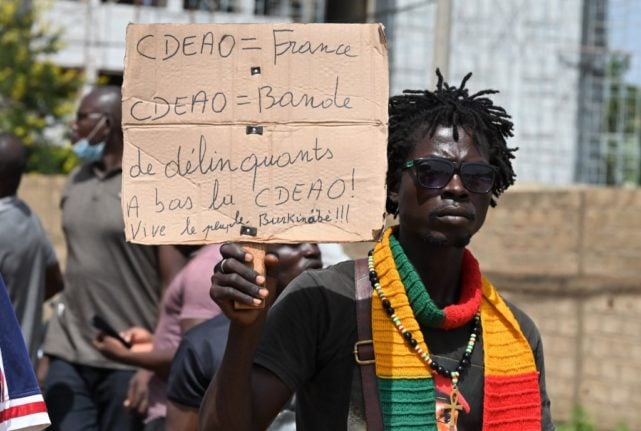Russia may be retreating in Ukraine but it is advancing rapidly on another front 7,000 kilometres away in what used to be French west Africa.
Vladimir Putin’s great African offensive – using bribery, lies, mercenaries and some genuine development aid – scored a new victory in recent days in Burkina Faso, one of the ten poorest countries in the world.
The second coup d’état in Ouagadougou in eight months brought to power a 30-something army captain who lauded Moscow and berated the “colonial” iniquities of France.
The immediate loser from Russia’s African campaign is what used to be called “Françafrique” – the once-deep political and economic involvement of France in its former African colonies. That decline is not new and has many causes. It is probably inevitable and might eventually be healthy, for both Africa and France.
If the Kremlin wasn’t involved…
The great losers from Russia’s stealthy invasion of west and central Africa will be the Burkinabés and other Africans. Whatever Vladimir Putin’s motives in building an African empire, it is certainly not to help Africans achieve greater control over their own lives, resources and governments.
The spearhead of Putin’s Africa policy is the Wagner mercenary army, run on the Kremlin’s behalf by a billionaire oligarch, Yevgeny Prigozhin. The Wagner army has already been implicated in brutal incidents and massacres in several African countries.
Who popped up this week to praise Burkina Faso’s new young strongman? Yevgeny Prigozhin.
In a bizarre statement, more like that of a government than a billionaire businessman, Prigozhin said that he “saluted and supported” Captain Ibrahim Traoré, a man who acted in the name of “liberty and justice”.
In return, Captain Traoré lambasted France and said that Burkina Faso was ready to seek “other partners ready to help in the fight against terrorism”. The next day the French embassy was attacked and vandalised.
The two statements amounted to a brazen admission that the coup was planned in Moscow. They also reflect a confidence that many west and central Africans now see Russia as their liberator from “imperialist” France.
Burkina Faso has been bombarded in recent months by social media propaganda accusing the deposed Colonel Damiba of being a French stooge. Similar material has appeared in the French language Russia Today TV channel and Sputnik news agency, which have a growing following in all Francophone central and west Africa countries.
Meanwhile, the various jihadist, radical Islamist forces operating in the Sahel and west and central Africa have been gaining ground (including one third of the territory of Burkina Faso). Russia is not in alliance with the Islamists but it does exploit their success for its own gain.
Trust by local people in the French forces deployed (with mixed effect) to fight the jihadis has been constantly undermined by Russian propaganda. The Islamist insurgence is, the propaganda says, just a pretext for “French colonial” interference. Otherwise, the jihadis would have been defeated long ago.
Mali, next door to Burkina Faso, also suffered a double coup by officers hostile to France in 2020 – leading Emmanuel Macron to end the nine years old French anti-Islamist military deployment in the country. Wagner Russian “mercenaries” are now heavily active in the country (though officially just “instructors”).
Similar anti-French feeling is being stirred up in Niger. In June, President Emmanuel Macron suspended all financial and military aid to Centrafrique (the Central Africa Republic) after accusing its government of being “the hostage of the paramilitary Russian Wagner group”.
France fears similar advances in Senegal and Ivory Coast.
This lightning advance of Russian influence in Africa explains in part Macron’s eloquent and angry speech to the UN last month in which he accused (by implication) African countries of betraying their own long-term interests by refusing to condemn the “new colonialism” of Putin’s invasion of Ukraine.
Anti-French feeling in Africa is not entirely a Russia invention. Successive Presidents since Jacques Chirac have tried to unwind the unhealthy and corrupt relationship which existed until the 1990s between Paris and African political elites. Resentment of France as the former colonial power remains – sometimes justified, sometimes fanciful.
In a sense, France has the worst of both worlds. It paying for its past sins rather than benefiting from its present, sometimes clumsy, efforts to fight Islamist terrorism, reduce corruption and foster democracy. Russian power has spread partly because France can no longer call those shots in Africa which Moscow accuses Paris of calling.
Emmanuel Macron has gone even further than his predecessors in trying to create a new relationship with “Françafrique.” He invited students, artists and successful entrepreneurs, as well as the usual politicians, to the annual France-Africa summit in Montpellier this year.
Macron has said that it is up to African countries whether they want to carry on with the so-called “African franc”, a shared currency (or actually two regional currencies), tied to the Euro and guaranteed by Paris. The “CFA” is the object of many anti-French fantasies in Africa but provides a stability which has helped all its member countries grow faster than most other African nations.
Into this difficult ground, Russia has advanced with much greater skill than it has shown in its brutal, failed attack on Ukraine. Many Africans have been persuaded that Moscow is their ally against a greedy, hypocritical West.
China has advanced with even more subtlety in other parts of Africa. In both cases, African countries may learn to their cost that they have exchanged one form of colonialism for another – even greedier and more corrupt.



 Please whitelist us to continue reading.
Please whitelist us to continue reading.
Member comments